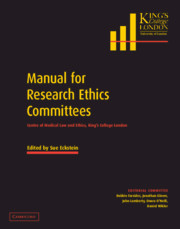Book contents
- Frontmatter
- Contents
- Editorial board
- Acknowledgements
- List of contributors
- Introduction
- Part I
- 1 The ethics of clinical research
- 2 Research ethics committees and the law
- 3 The regulation of medical research: a historical overview
- 4 The regulation of medical research in the UK
- 5 Observational and epidemiological research
- 6 Social survey research
- 7 Approaching qualitative research
- 8 Complementary and alternative medicine: challenges for research ethics committees
- 9 The ethical review of student research in the context of the governance arrangements for research ethics committees
- 10 The ethics of genetic research
- 11 Research or audit?
- 12 Randomised controlled trials
- 13 Determining the study size
- 14 Risk assessment for research participants
- 15 Absorbed radiation in patient and volunteer studies submitted to the ethical committee: a memorandum
- 16 A guide to the use of radioactive materials and radiological procedures for research purposes
- 17 Indemnity in medical research
- 18 The prevention and management of fraud and misconduct: the role of the LREC
- 19 Understanding clinical trials: a model for providing information to potential participants
- 20 The law relating to consent
- 21 Writing information for potential research participants
- 22 The law relating to confidentiality
- 23 Research involving vulnerable participants: some ethical issues
- 24 The ethics of research related to healthcare in developing countries
- Part II
- Index
6 - Social survey research
Published online by Cambridge University Press: 08 January 2010
- Frontmatter
- Contents
- Editorial board
- Acknowledgements
- List of contributors
- Introduction
- Part I
- 1 The ethics of clinical research
- 2 Research ethics committees and the law
- 3 The regulation of medical research: a historical overview
- 4 The regulation of medical research in the UK
- 5 Observational and epidemiological research
- 6 Social survey research
- 7 Approaching qualitative research
- 8 Complementary and alternative medicine: challenges for research ethics committees
- 9 The ethical review of student research in the context of the governance arrangements for research ethics committees
- 10 The ethics of genetic research
- 11 Research or audit?
- 12 Randomised controlled trials
- 13 Determining the study size
- 14 Risk assessment for research participants
- 15 Absorbed radiation in patient and volunteer studies submitted to the ethical committee: a memorandum
- 16 A guide to the use of radioactive materials and radiological procedures for research purposes
- 17 Indemnity in medical research
- 18 The prevention and management of fraud and misconduct: the role of the LREC
- 19 Understanding clinical trials: a model for providing information to potential participants
- 20 The law relating to consent
- 21 Writing information for potential research participants
- 22 The law relating to confidentiality
- 23 Research involving vulnerable participants: some ethical issues
- 24 The ethics of research related to healthcare in developing countries
- Part II
- Index
Summary
What is social survey research?
Social researchers have available to them a wide variety of research methods. They may send questionnaires through the post to elicit information, they may interview individuals on the doorstep or they may conduct interviews over the telephone. All of these methods of information gathering can be used to gain a structured and systematic set of data, and, this, in essence, is the major feature of the social survey. Quite simply, social surveys are characterised by information on the same variables (such as attitudes and beliefs) being collected from at least two (and usually far more) individuals.
This document outlines the purpose of surveys, how they are undertaken, and potential problems in the gaining of survey data.
Why undertake social surveys?
The major purpose of social surveys is to describe the characteristics of a sample of people, or to attempt to gain some insight into the possible causes of certain phenomena. However, the social survey is, unlike randomised controlled trials, a non-experimental design. Social survey research does not attempt to influence medical interventions. Instead social survey researchers attempt to find patterns in data that are consistent and systematic. Such data can be used to inform policy decision making. Thus, for example, surveys have been conducted in which respondents were asked about their health and their behaviour. From such data it has been found that, for example, those who smoke and drink heavily are more likely to report certain illnesses. Such information can be used to inform campaigns aimed at improving people's behaviour.
- Type
- Chapter
- Information
- Manual for Research Ethics CommitteesCentre of Medical Law and Ethics, King's College London, pp. 37 - 39Publisher: Cambridge University PressPrint publication year: 2003



